Top 5 Brands:
Brand: One Ummah
Types: I & III
Price: Low ($1.89/oz)
Certification: ISA Halal (USA)
Verdict: Highly Recommended (only downside is that it only comes in 1 size)
Buy on Amazon: Click here
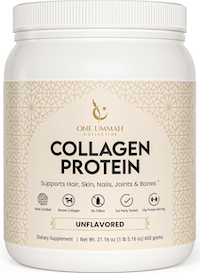
Brand: Zaytun Vitamins
Types: I & III
Price: Fair ($2.30/oz)
Certification: ISA Halal (USA), GMP
Verdict: Recommended
Buy on Amazon: Click here
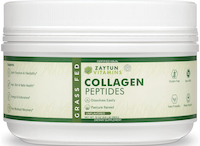
Brand: Shifaa Nutrition
Types: I & III
Price: Fair ($2.37/oz)
Certification: ISA Halal (USA), GMP, Eurofins
Verdict: Recommended
Buy on Amazon: Click here
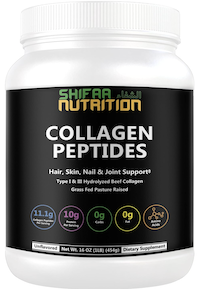
Brand: Sunna Supplements
Types: I & III
Price: Expensive ($4.53/oz)
Certification: The Halal Trust (UK)
Verdict: Avoid (too expensive)
Buy on Amazon: Click here
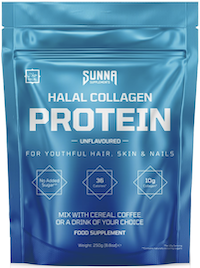
Brand: Hearthy Foods
Types: I & III
Price: Low ($1.69/oz)
Certification: Halal according to brand but certifier is unspecified
Notes: I personally experienced an unpleasant smell coming from the powder - may indicate substandard processing methods
Verdict: Avoid (Halal status is questionable)
Buy on Amazon: Click here
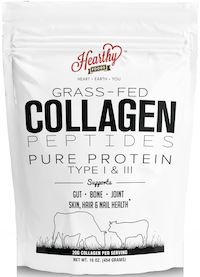
Overview
Collagen is the most abundant structural protein in humans. It's packed with the following amino acids: glycine, proline, and hydroxyproline. These form triple-helix fibers giving tissues tensile strength and elasticity. Your body makes collagen, but production declines with age and certain stressors (e.g., UV exposure, smoking, poor sleep, high sugar intake, etc).
3 Common types:
- Type I: For skin, bones, tendons, ligaments (most common in supplements)
- Type II: For cartilage (often used for joint support)
- Type III: For skin and blood vessels (often accompanies Type I)
Type I and III are the most common.
What makes it "Halal"?
To be halal, collagen must:
- Come from halal-permissible animals (e.g., bovine/cattle, fish). Porcine (pork) sources are haram
- Follow halal slaughter (zabiha) for land animals (grass fed is NOT sufficient)
- Avoid haram processing aids e.g., porcine enzymes, alcohol as a solvent, and prevent cross-contamination with non-halal materials
- Maintain traceability through the supply chain (from hides/skins/scales to finished powder)
- Be certified by a reputable halal certification body (details below)
Note: Fish is generally halal, however processing methods still matter. Things like alcohol-free extraction and halal-compliant facilities should be utilized during processing.
Halal Certification Bodies
When shopping, look for an authentic halal logo from respected certifiers. Some well-known examples include:
- ISA, IFANCA (USA)
- JAKIM (Malaysia)
- MUI / BPJPH (Indonesia)
- HFA (UK)
- SANHA (South Africa)
- HCAA, HDC, and various regional bodies
Sources of Halal Collagen
a) Bovine (cow)
- Typically derived from cow hides and sometimes bones
- Must be from zabiha-slaughtered cattle
- Usually Type I & III
b) Marine (fish)
- From fish skin/scales - often cod, tilapia
- Naturally halal as a species category, but processing must be halal-compliant
- Often only Type I, sometimes with smaller peptide sizes
- Allergen note: fish is a major allergen; labels must declare this
c) Poultry
- Less common in powders. When present, ensure halal poultry slaughter and processing compliance
- Type II from chicken sternum cartilage appears in some joint formulations
I've personally only ever tried Type I & III bovine collagen, which is the most common.
True collagen is animal-derived. The vegan variety is typically collagen builders (vitamin C, specific amino acids, plant extracts) or fermentation-derived (rare, expensive, and still needs halal verification of the production system).
How it's made
First off is the sourcing and traceability: hides/skins/scales are collected from halal-approved suppliers with documentation linking each batch back to halal-compliant animals/fisheries. These are then removed of fat/minerals via approved halal chemicals (e.g., lime, acid), with no use of haram solvents.
Collagen is then extracted using controlled heat and pH from tissue. Food-grade enzymes (must be halal-suitable, often microbial) break collagen into bioactive peptides. This process is known as hydrolysis.
Next, microfiltration/ultrafiltration is used to remove impurities and spray drying turns the collagen into a fine powder. After that, quality tests are performed to detect purity, heavy metals, amino acid profile, moisture, peptide size distribution, etc.
The product is then packaged in halal-compliant facilities with preventive controls against cross-contact.
Ingredient & Label Considerations (Halal Details That Matter)
If buying capsules, confirm the shell is bovine halal gelatin or HPMC/"veggie". Avoid porcine gelatin.
Flavors & Sweeteners:
"Natural flavors" should be halal-compliant; some flavors use alcohol as carriers. Halal certifiers typically require alcohol-free carriers or verify negligible residuals based on their standard.
Common sweeteners (stevia, monk fruit, sucralose) are typically fine; verify flavor houses are halal-approved.
Additives & Cofactors:
- Vitamin C (ascorbic acid) often added to support collagen synthesis.
- Hyaluronic acid, silica, zinc, copper, biotin are common in "beauty" blends-verify halal status of each raw ingredient.
- Anti-caking agents (e.g., silicon dioxide) are usually fine; ensure halal certification covers them.
Allergen & Cross-Contact:
- Marine collagen must declare fish
- Facilities should disclose potential cross-contact (e.g., dairy, soy) and follow GMP/HACCP
Collagen vs gelatin vs peptides
Gelatin is partially hydrolyzed collagen that gels in liquids.
Collagen peptides are further broken down to small peptides (~2 - 5 kDa) that dissolve in hot or cold liquids and don't gel, improving mixability and absorption.
What Collagen Peptides Can (and Can't) Do
Support skin elasticity, hydration, and prevent wrinkles
Studies (small to moderate size) often report improvements in skin hydration and elasticity and reduced wrinkle depth after 4 - 12 weeks of daily intake (usually 2.5 - 10 g/day), sometimes enhanced with vitamin C/hyaluronic acid.
Joints (cartilage, comfort, mobility):
For joint health, Type II and generic collagen peptides have shown modest improvements in joint comfort and function in some trials, particularly over 3 - 6 months.
Skin, Nails, Hair
Some evidence suggests reduced nail brittleness and improved nail growth; hair claims are common but evidence is mixed.
Muscle recovery
Collagen protein is not a complete protein (low in tryptophan). It may support connective tissue recovery when paired with resistance training and adequate overall protein intake, but it doesn't replace high-quality proteins (whey, soy, dairy, eggs) for muscle protein synthesis.
Benefits are gradual, often measured over weeks to months, and vary by dose, adherence, baseline diet, sun exposure, sleep, and overall lifestyle.
Gut health
- Rebuilds the gut lining: collagen is rich in amino acids glycine and glutamine, which help repair the intestinal wall. A stronger gut lining reduces “leaky gut,” where small particles slip into the bloodstream and trigger inflammation.
- Supports the mucus layer: glycine helps your body produce mucus that protects the inner gut wall from stomach acid and harmful bacteria — like a natural shield for your digestive tract.
- Reduces inflammation: some studies suggest collagen peptides can calm low-grade inflammation in gut by improving tissue integrity and supporting immune balance.
- Aids in digestion: collagen contains glycine, which stimulates stomach acid production. Healthy acid levels are essential for breaking down food properly and preventing bloating or reflux.
- Promotes smooth intestinal movement: the amino acids in collagen help the muscles of the digestive tract contract efficiently, improving motility and reducing sluggish digestion.
- Supports beneficial bacteria: a healthy intestinal barrier allows good bacteria to thrive while keeping toxins out, creating a better environment for your gut microbiome.
Dosing, Timing, and How to Use
The typical daily dose is 2.5 - 15 g/day, with 5 - 10 g/day is a common sweet spot. Timing can be flexible. Many people take it once daily. For these targeting training or rehab, some athletes take it 30 - 60 minutes before activity with vitamin C (>=50 mg) to support collagen formation.
Mixing tips
- Collagen peptides: dissolve in hot or cold liquids (coffee, smoothies, water)
- Gelatin: gels in cold liquids; great for cooking (gummies, desserts), but not the same as peptides
Regarding whether to take collagen with or without food - either is fine. Also, consistent consumption matters more than timing of consumption. I usually just mix in a scoop with my morning smoothie.
Quality & Purity: How to judge good Halal collagen powder
- Most Important: Halal certification clearly shown and verifiable online
- Facility certification (GMP in the USA) clearly shown and verifiable online
- Source transparency: bovine (zabiha) vs. marine (fish species), country of origin
- Third-party testing: Certificates like NSF/ANSI, Informed Choice, or published COAs add confidence (microbial counts, heavy metals, peptide size)
- Amino acid profile: Look for high glycine, proline, and hydroxyproline; hydroxyproline is a useful authenticity marker
- No unnecessary fillers or sugar (if you're counting macros)
Safety, Side Effects, and Who Should Be Cautious
Collagen powder is generally well-tolerated. Possible mild effects are upset GI, fullness, or aftertaste.
Allergy concerns
- Fish allergy: avoid marine collagen
- Check cross-contact statements
Concerns about Medical conditions:
- If you have kidney disease, gout, or significant liver disease, discuss total protein intake with a clinician before consumption
- If you are pregnant and/or lactating, consult a qualified healthcare professional
- If you are on medications, always disclose supplements to your doctor
Halal Nuances You Might Not Have Considered
- Enzymes used in hydrolysis must be halal-suitable (microbial or plant-derived where required; no porcine enzymes)
- Solvents/carriers: Some certifiers prohibit alcohol outright; others allow negligible, non-intoxicating residuals. Policies vary-check the certifier's standard or ask the brand for documentation
- Capsule lubrication/finishes: If buying capsules, even minor processing aids should be covered by halal certification scope
- Co-manufacturing facilities: Ask whether the facility handles porcine or non-halal materials and how cross-contamination is prevented (dedicated lines, validated cleaning, allergen/haram changeovers)
Collagen for Specific Goals
Better skin/beauty
Aim for 2.5 - 10 g/day, consider formulations with vitamin C and possibly hyaluronic acid. Also, practice diligent UV protection, get enough sleep, and maintain a protein-adequate diet. This was my primary goal when I started taking collagen. It took about a month for me to notice differences in my skin after starting my doses.
Stronger joints/cartilage
5 - 10 g/day peptides or Type II (some use lower doses of undenatured Type II). Combine with strength training, weight management, and an anti-inflammatory diet.
Better athletic recovery
10 - 15 g + ~50 mg vitamin C, ~30 - 60 minutes pre-training, is a common protocol aimed at connective tissues (tendons/ligaments). Continue adequate total protein intake (usually 1.6 - 2.2 g/kg/day for strength athletes; adjust per clinician).
Sustainability & Ethics
- Bovine collagen often utilizes hides that would otherwise be waste, improving by-product utilization
- Marine collagen upcycles skins/scales; consider fishery sustainability and by-catch policies
- If animal welfare matters to you, ask brands about animal welfare standards, traceability, and supplier audits
- Seek recyclable or post-consumer packaging options when possible
Bottom Line
Halal collagen powder offers a way to gain the potential benefits of collagen without compromising Islamic dietary requirements. The core differences from regular collagen are source, slaughter/processing compliance, and certification-the underlying peptides are biochemically similar. Choose products with credible halal certification, transparent sourcing, third-party testing, and appropriate dosing, and pair your routine with smart lifestyle habits (UV protection, adequate protein, sleep, and training) for the best chance at meaningful results.